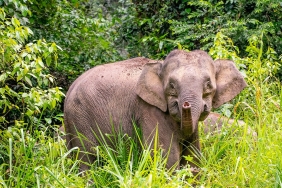GETTING TO KNOW ELEPHANT FLYING SQUAD IN TESSO NILO NATIONAL PARK
Every October 4, the World Wide Fund for Nature (WWF) celebrates World Animal Day. The World Animal Day celebration reminds us that every animal has an ecological role and has an impact on human life. In Indonesia, WWF seeks to protect endangered species that are important to ecosystems, food chains, species that contribute to maintaining ecosystem stability and habitat regeneration, and species that represent conservation needs on a broad scale. One of these species is the Sumatran elephant.
This charismatic animal plays an important role in forest regeneration. The presence of elephants in an area also indicates the availability of resources to support other animals. Tesso Nilo National Park is one of the Sumatran elephant conservation areas because it has a relatively better elephant habitat than the surrounding areas. However, forest conversion and fragmentation have resulted in elephants that once lived on a large scale are now fragmented into smaller groups that can potentially lead to conflicts between humans and elephants. Besides harming humans, these conflicts also harm elephants. To reduce elephant disturbance, it is not uncommon for people to use methods that result in the death of elephants.
To address the threat and risk of conflict, in 2004 WWF-Indonesia together with the Tesso Nilo National Park established the Elephant Patrol Team or Elephant Flying Squad. The team consists of 4 trained elephants and 8 nurses / mahouts who are tasked with herding wild elephants that enter community gardens to return to their habitat in Tesso Nilo National Park. This activity has also been proven to reduce conflicts between elephants and humans by 63.8% - 78.7% in the period 2004-2010.
The work of the Elephant Patrol Team is also supported by Toyota Motor Corporation through a global partnership with WWF in the "Living Asian Forest Project" program held in Tesso Nilo National Park and several other locations in Sumatra and Kalimantan. WWF and Toyota Motor Corporation embarked on a five-year partnership with the aim of accelerating the global transition to sustainability. Through this partnership, they will work together to promote biodiversity conservation, increase environmental awareness and accelerate the shift towards a carbon-free society.
The Elephant Flying Squad team regularly, twice a week, patrols the areas bordering Tesso Nilo National Park. The mahouts assigned to Tesso Nilo National Park must undergo special training as Elephant Flying Squad mahouts. This is because the duties and functions of the Elephant Flying Squad are different, not just trainers or nurses of elephants because they are also in charge of patrol activities where they are also required to undergo technical training related to the patrol tasks they will carry out. There are 10 mahouts assigned to the Elephant Flying Squad team, namely Ruswanto, Erwin Daulay, Fikri Pohan, Junjung Daulay, Adrianto, Tengku Asril, Sari Tua, Herianto, Rozi Nurbit, and Bagus Prayudi. Two of these mahouts are mahouts of Flying Squad's elephant calves.
The welfare and health of the Flying Squad elephants in Tesso Nilo National Park is of great concern. The trained elephants are routinely taken to the forest and not kept in captivity. What distinguishes them from wild elephants is that they have a physical exercise schedule as well as a patrol schedule twice a week in the morning for two hours each patrol. To maintain their quality of life, the Flying Squad elephants are well cared for by a veterinarian, drh. Annisa Wandha Sari. Each individual elephant member of the Elephant Flying Squad, namely Rahman, Indro, Ria, Lisa and their children Rimbani, Harmoni Rimbo, Tesso, and Imbo have their own medical records.
The relationship between mahouts, veterinarians and elephants is close and strong. This contributes to the smooth running of each patrol. During patrols, mahouts and their elephants will identify signs of wild elephants so that efforts to drive them into the forest can be made early. Not only that, the team will also monitor the presence of illegal logging and hotspots. When encountering other animals, such as tapirs, deer, etc., they will also take notes.





